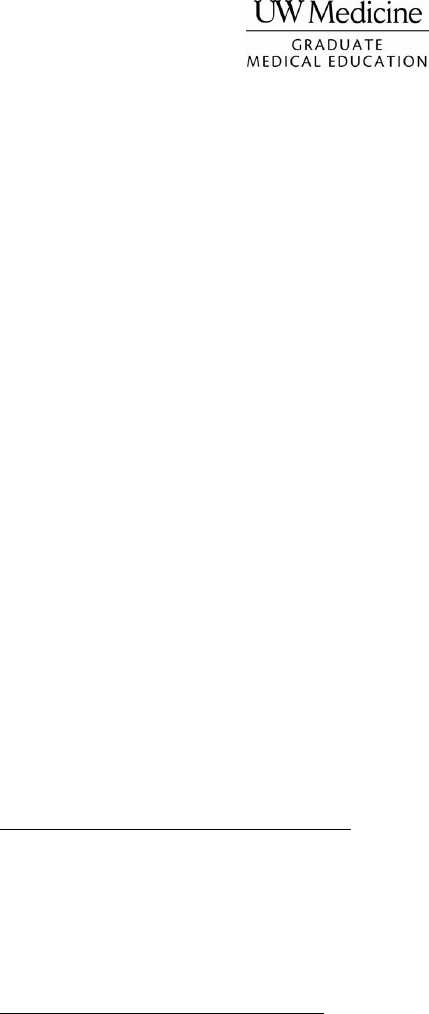
University of Washington School of Medicine Effective: 12/12/2019
Graduate Medical Education Policy Page 1 of 5
Well-Being Policy
Scope: All University of Washington (UW) residencies and fellowships accredited by the
Accreditation Council for Graduate Medical Education (ACGME) and sponsored by the UW
School of Medicine (UWSOM). Non-ACGME accredited programs or programs accredited by
the Commission on Dental Accreditation (CODA) may choose to utilize this policy.
Background: Well-being of residents, fellows (inclusively referred to as “residents” hereafter), and faculty
members is a key element of a positive learning and working environment. Each program, in
partnership with its Sponsoring Institution (UWSOM), has the responsibility to address
clinicians’ psychological, emotional, and physical well-being. All members of the health care
team share responsibility for the well-being of others.
Policy: Each residency and fellowship program, in partnership with its Sponsoring Institution, must
ensure healthy and safe learning and working environments that promote resident well-being
[ACGME Common Program Requirements (CPR) I.D.2.]. The program must monitor the
clinical learning and working environment at all participating sites [CPR I.B.3].
The program, in partnership with the Sponsoring Institution, must offer appropriate
infrastructure, services, resources (including space, technology, and supplies), and leave
from training when needed. The responsibility of the program, in partnership with the
Sponsoring Institution, must include efforts to enhance the meaning that each resident finds
in the experience of being a physician, including (1) protecting time with patients, minimizing
non-physician obligations, providing administrative support, promoting progressive autonomy
and flexibility, and enhancing professional relationships
[CPR VI.C.1.a)]; and (2) attention to
scheduling, work intensity, and work compression that impacts resident well-being [CPR
VI.C.1.b)].
Sponsoring Institution’s Responsibilities
The Sponsoring Institution must (1) oversee its programs’ fulfillment of responsibility to
address well-being of residents and faculty members, consistent with the Common and
(sub)specialty-specific Program Requirements, addressing areas of non-compliance in a
timely manner [ACGME Institutional Requirements (IR) III.B.7.a)]; and (2) ensure that
programs provide a professional, respectful, and civil environment that is free from
unprofessional behavior [IR III.B.6.d)].
Diversity, Equity, and Inclusion (DEI)
Programs must create and nurture a safe work environment for all. Programs, in partnership
with their Sponsoring Institutions, must provide a professional, equitable, respectful, and civil
environment that is free from discrimination, sexual and other forms of harassment,
mistreatment, abuse, or coercion of students, residents, faculty, and staff [CPR VI.B.6]. No
staff, resident, or faculty member should experience discrimination or harassment. Any bias
incidents--offensive remarks/actions--are subject to the UW Medicine Policy on Professional
Conduct and UW Executive Order 31. For support and resources, see:
UW GME Commitment to Diversity, Equity, and Inclusion
UW Diversity Blueprint
UW Medicine Healthcare Equity Toolkit
UW SOM Center for Health Equity, Diversity, and Inclusion
UW Network of Underrepresented Residents and Fellows (NURF)
UW SOM Committee on Minority Faculty Advancement (CMFA)
UW Diversity (UW campus-wide resources on diversity)

University of Washington School of Medicine Effective: 12/12/2019
Graduate Medical Education Page 2 of 5
Infrastructure and Services
The program, in partnership with its Sponsoring Institution, must provide for (1) access to
food while on duty
[CPR I.D.2.a)]; (2) safe, quiet, clean, and private sleep/rest facilities
available and accessible for residents with proximity appropriate for safe patient care
[CPR
I.D.2.b)]; (3) clean and private facilities for lactation that have refrigeration capabilities, with
proximity appropriate for safe patient care [CPR I.D.2.c)]; (4) accommodation of clinical and
non-clinical schedules to allow milk expression/pumping during the work day, in accordance
with federal law (space and time required for lactation are critical for the well-being of the
resident and their family); (5) safe transportation options for residents who may be too
fatigued to safely return home [CPR VI.D.3.]; (6) security and safety measures appropriate to
the participating site
[CPR I.D.2.d)]; and (7) accommodations for residents with disabilities
consistent with the Sponsoring Institution’s policy
[CPR I.D.2.e)].
In addition, each program, in partnership with its Sponsoring Institution, must provide access
to appropriate tools for self-screening
[CPR VI.C.1.e).(2)], as well as confidential and
affordable mental health assessment, counseling, and treatment, including access to urgent
and emergent care 24 hours a day, seven days a week.
[CPR VI.C.1.e).(3)]. Resources at
participating sites vary by location. Residents should contact the program’s site director for
more information about a specific site.
Safety Monitoring
Each program shares responsibility with the Sponsoring Institution for gathering information
and utilizing systems that monitor and enhance resident and faculty member safety. The
responsibility of the program, in partnership with the Sponsoring Institution, must include
evaluating workplace safety data and addressing the safety of residents and faculty
members [CPR VI.C.1.c)] (e.g., monitoring of workplace injuries, physical or emotional
violence, and emotional well-being after adverse events.)
Leave
Each program must allow an appropriate length of absence for residents in circumstances in
which they may be unable to perform their responsibilities or to attend work, including but not
limited to fatigue, illness, family emergencies, and parental leave [CPR VI.C.2.)]. In addition,
residents must be given the opportunity to attend medical, mental health, and dental care
appointments, including those scheduled during their working hours
[CPR VI.C.1.d).(1)].
Each program must (1) adhere to the relevant stipulations stated in University of Washington
Housestaff Association (UWHA) Contract (Collective Bargaining Agreement) and Residency
and Fellowship Position Appointment (RFPA); and (2) refer to other pertinent policies and
procedures, including UW GME Guidance on Reporting Paid and Unpaid Leave Time for
Residents and Fellows, relevant specialty board leave policies, and program-specific leave
policies.
Coverage/Continuity of Patient Care
The program must have policies and procedures in place to ensure coverage/continuity of
patient care [CPR VI.C.2.a)] when residents are unable to perform their patient care
responsibilities. Coverage mechanisms should be applied to situations in which resident
fatigue precludes safe delivery of patient care. These policies must be implemented without
fear of negative consequences for the resident who is or was unable to provide the clinical
work [CPR VI.C.2.b).
Schedule Release
Each program is required to release residents’ clinical and non-clinical schedules to
residents and faculty in a timely manner in order to accommodate their planning of
professional and personal lives. See the Program Policy section for the specific
requirements and recommendations.

University of Washington School of Medicine Effective: 12/12/2019
Graduate Medical Education Page 3 of 5
Concern Reporting System
The program director must provide a learning and working environment in which residents
have the opportunity to raise concerns and provide feedback in a confidential manner as
appropriate, without fear of intimidation or retaliation [CPR II.A.4.a).(10)]. The program, in
partnership with its Sponsoring Institution, must encourage residents and faculty members to
alert the program director or other designated personnel or programs when they are
concerned that another resident or faculty member may be displaying signs of burnout,
depression, substance abuse, suicidal ideation, or potential for violence [CPR VI.C.1.e).(1)].
Residents and faculty are strongly encouraged to follow the mechanisms developed by the
UW GME when reporting their concerns. Any bias incidents or violation of nondiscrimination
and nonretaliation must be reported through the mechanisms described in the UW Medicine
Policy on Professional Conduct, UW Bias Reporting Tool, University Complaints
Investigation and Resolution Office (UCIRO), or UW Executive Order 31. In case of
physician impairment, every individual, including program directors, faculty, and residents, is
responsible to (1) monitor signs of impairment; and (2) follow the UW GME Physician
Impairment Policy for reporting. Remediation may take place based on the UW GME
Remediation Policy and Grievance Procedure.
The Sponsoring Institution with more than one program must ensure availability of an
organization, council, town hall, or other platform that allows all residents from within and
across the programs to communicate and exchange information with other residents relevant
to their programs and their learning and working environment [IR II.C.]. The Resident and
Fellow Open Forum serves as the platform for communication among residents regarding
working and learning environments. This Open Forum ensures that all residents have (1) the
opportunity to directly raise a concern [IR II.C.1]; (2) the option, at least in part, to conduct
their forum without the DIO, faculty members, or other administrators present [IR II.C.2.]; and
(3) the option to present concerns that arise from discussions at the forum to the DIO and
GMEC [IR II.C.3].
Educational Requirements
The Sponsoring Institution, in partnership with its programs, must educate residents and
faculty members concerning the professional responsibilities of physicians, including their
obligation to be appropriately rested and fit to provide the care required by their patients [IR
III.B.6.b)]. Programs, in partnership with their Sponsoring Institutions, should have a process
for education of residents and faculty regarding unprofessional behavior and a confidential
process for reporting, investigating, and addressing such concerns [CPR VI.B.7]. The
program must integrate residents’ personal and professional well-being as part of
professionalism into the curriculum
1
. Residents must demonstrate competence in ability to
recognize and develop a plan for one’s own personal and professional well-being as part of
professionalism
[CPR IV.B.1.a).(1).(f)]
1
.
The responsibility of the program, in partnership with the Sponsoring Institution, must include
attention to resident and faculty member burnout, depression, and substance abuse [CPR
VI.C.1.e)]. The program, in partnership with its Sponsoring Institution, must educate
residents and faculty members to (1) identify the symptoms of burnout, depression, and
substance abuse, including means to assist those who experience these conditions
[CPR
VI.C.1.e)]; and (2) recognize those symptoms in themselves and how to seek appropriate
care
[CPR VI.C.1.e)]. In addition, programs must educate all faculty members and residents
to (1) recognize the signs of fatigue and sleep deprivation
[CPR VI.D.1.a).]; (2) be aware of
alertness management and fatigue mitigation processes [CPR VI.D.1.b)]; and (3) use fatigue
mitigation processes to manage the potential negative effects of fatigue on patient care and
learning
[CPR VI.D.1.c.].

University of Washington School of Medicine Effective: 12/12/2019
Graduate Medical Education Page 4 of 5
Program/Faculty Assessment
Each program’s Program Evaluation Committee (PEC) should consider aggregate resident
and faculty well-being elements in its assessment of the program
[CPR V.C.1.c).(5).(a)].
Faculty members must pursue faculty development designed to enhance their skills in
fostering their own and their residents’ well-being at least once a year [CPR II.B.2.g).(3)]
2
.
See UW GME Annual Program Evaluation policy.
Well-Being Resources/Tools
UW GME Wellness Service (this includes self-screening tools as well as confidential and
free counseling for residents and their significant others)
The Whole U (holistic wellness)
UW CareLink (counseling, legal advice, work-life solutions, incident response services)
UW Childcare Resources
Washington Physicians Health Program
ACGME Tools and Resources
Well-Being Index (free online tool to assess medical professional’s well-being)
Action Collaborative on Clinician Well-Being and Resilience (National Academy of
Medicine)
Now Matters Now (skills and support for coping with suicidal thoughts)
American Foundation for Suicide Prevention
Program
Policies: Each program must create a well-being policy that encourages optimal resident and faculty
well-being [CPR VI.C.1.d)] and share it with members of the program. The policy must
address:
Diversity, Equity, and Inclusion (DEI): Each program must list and share services and
resources on DEI.
Infrastructure, Services, and Resources: Each program must list and share on- and off-
campus infrastructure, services, and resources on well-being. Each program, in collaboration
with training sites, must create and share a procedure to adjust breastfeeding-mothers’
schedules to protect adequate time for regular milk expression/pumping during the workday.
Safety Monitoring: Each program must designate (an) individual(s) who will collaborate with
UW GME to collect, analyze, and evaluate workplace safety data. The designee may
collaborate with the site directors at participating sites to collect data in those sites.
Leave Request and Reporting: Each program must develop a clear, transparent, and
equitable leave request and reporting process and share it with residents annually. The
program must use the Residency Management System to report all leave types. Unpaid time
off must be recorded in Workday (UW’s HR/payroll system). Leave request processes must
include information on how to report leave related to fatigue, illness, and
medical/dental/mental care appointments scheduled during working hours.
Coverage/Continuity of Patient Care: Each program must develop a clear system for
coverage/continuity of patient care. This system must (1) include coverage plans for
residents who take leave, including leave because of fatigue and medical/dental/mental
health appointments scheduled during working hours; (2) outline the mechanism to ensure
that residents who are unable to provide clinical work can utilize leave and request coverage
for patient care without fear of negative consequences; and (3) explain how the program
ensures that the coverage system is implemented equitably.

University of Washington School of Medicine Effective: 12/12/2019
Graduate Medical Education Page 5 of 5
Schedule Release: Yearly block schedules, including identification of months that will have
call or jeopardy responsibilities, must be distributed no later than the beginning of the
academic year. Exclusive of the first block of the academic year, complete schedules,
including specific shifts, call and clinic schedules, and days off, must be provided no later
than 30 days in advance of the rotation start date. GME strongly encourages distribution of
complete schedules 60 days prior to the rotation start date for those programs with capacity
to do so. [This new schedule expectation will be developed over the remainder of AY20, with
an implementation date of July 1, 2020.] Last minute changes should be communicated to
residents directly and promptly after the release of the schedule, with a notification to the
program director and affected faculty.
Concern Reporting System: Each program must (1) distribute the UW GME Reporting
System to encourage residents to report their concerns; (2) share the UW Medicine Policy
on Professional Conduct, UW Bias Reporting Tool, University Complaints Investigation and
Resolution Office (UCIRO) and Executive Order 31 for bias incident reporting; and (3) outline
and share its own reporting system with all members of the program.
Educational Requirements: Each program must (1) ensure all incoming residents’
completion of an online physician well-being module; (2) list and share fatigue mitigation and
alertness management resources; and (3) incorporate well-being into the curriculum of its
choice
1
. The program should (1) identify or create a supplemental curriculum
(training/workshops/ conferences) that addresses residents’ personal and professional well-
being, attending to diversity and inclusion; and (2) use survey, individual/focus-group
interview, or other methods of choice to evaluate residents’ ability to recognize and plan for
their own well-being.
Program/Faculty Assessment: Each program should analyze data collected through the
Annual Program Evaluation (APE), resident evaluations of faculty, faculty evaluations of
residents, and other evaluations to improve well-being of all members of the program.
References
1
Fellowship programs are exempt from this requirement.
2
Faculty in fellowship programs are exempt from this requirement.
